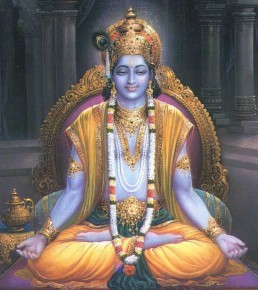Swami Chinmayananda
Swami Chinmayananda Commentary
If the preceding verse indicated things that are to be acquired and brought about in the relatively outer surfaces of the meditator’s personality, here we have a list of things which are to be renounced from the inner core of the meditator’s personality. Here are the enduring values-of-life a meditator must learn to live.
The items enumerated in the stanza are not, in fact, so many different items, but they are all different manifestations of one and the same wrong notion, namely the “I-act-mentality” (Ahamkara). When this “sense-of-agency” develops, ego-centric vanities intensify within our bosom, and they manifest as “power” (Balam) — the “power” to strive and struggle, sweat and strain, to fulfil passions and desires. A powerful ego will, with each success in the sensuous world, gather to itself more and more “pride,” or “arrogance” (Darpam).
To an individual personality, working under the influence of both “power” and “arrogance,” “lust and anger” (Kaama and Krodha) are but natural, and thereafter, he becomes a mad machine of restlessness within and of disturbances around, ever anxiously bearing himself down upon the society in order that he may, by means fair or foul, acquire, possess and aggrandise the objects of his fancy, indicated here by the term “aggrandisement” (Parigraha).
The six items listed above are nothing but manifestations of the “sense-of-agency” — the ‘I-act-mentality’ (Ahamkaara). Krishna asks the meditator to forsake these and thus to immediately become egoless (Nirmamah) and peaceful (Shaantah). This is not the peace of the grave nor the quiet of the desert; this is the peace that arises out of the fullness of ‘wisdom,’ out of our absolute satisfaction experienced in the Realm-of-Perfection.
All restlessness is caused by the ego and its onward rush towards finite objects, seeking among the ephemeral, a satisfaction and joy that is permanent and enduring. When this sense-of-agency and endless seeking of sense-gratifications have been renounced, the seeker (saadhaka) experiences a relative quiet within his bosom. He who is tuned thus, through understanding and discipline, can discover in himself the required balance and equipoise to rocket his total personality into the higher climbs of “conscious unfoldment.” The stanza does not say that such an individual has reached Perfection, but it definitely says that “HE IS FIT TO BECOME BRAHMAN.” The above is but a preliminary preparation for the final realisation.
WHAT THEN IS THE NEXT STAGE OF DEVELOPMENT? THE GEETA EXPLAINS:
Adi Sankara Commentary
(That person) vimucya, having discarded; ahan-karam, egotism, thinking of the body, organs, etc. as the ego; balam, force-which is associated with desire and attachment; not the other kind of strength consisting in the fitness of the body etc., becuase being natural it cannot be descarded-; darpam, pride, which follows elation and leads to transgresson of righteousness-for the Smrti says, ‘An elated person becomes proud; a proud man transgresses righteousness’ (Ap. Dh. Su. 1.13.4); kamam, desire; krodham, anger, aversion; parigraham, superfluous possessions-even after removing the defects in the organs and the mind, there arises the possibility of acceptance of gifts either for the maintenance of the body or for righteous duties; discarding them as well, i.e. becoming a mendicant of the param-hamsa class; nirmamah, free from the idea of possession, becoming devoid of the idea of ‘me’ and ‘mine’ even with regard to so much as one’s body and life; and for the very same reason, santah, serene, withdrawn; the monk who is effortless and steadfast in Knowledge, kalpate, becomes fit; brahma-bhuyaya, for becoming Brahman.
The Bhagavad Gita with the commentary of Sri Sankaracharya – Translated by Alladi Mahadeva Sastry
Holy Geeta – Commentary by Swami Chinmayananda
The Bhagavad Gita by Eknath Easwaran – Best selling translation of the Bhagavad Gita
The Bhagavad Gita – Translation and Commentary by Swami Sivananda
Bhagavad Gita – Translation and Commentary by Bhaktivedanta Swami Prabupadha
Srimad Bhagavad Gita Chapter 18 – Verse 53 – 18.53 ahankaram balam – All Bhagavad Gita (Geeta) Verses in Sanskrit, English, Transliteration, Word Meaning, Translation, Audio, Shankara Bhashya, Adi Sankaracharya Commentary and Links to Videos by Swami Chinmayananda and others – 18-53

